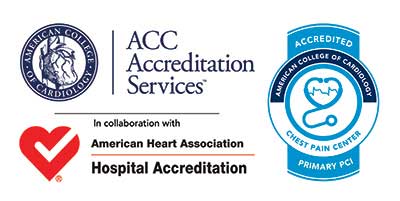Accredited Chest Pain Center in Derry, New Hampshire
A heart attack—the blockage of blood flow to the heart—can cause permanent and even life-threatening damage. When minutes count, trust Parkland Medical Center's experienced cardiovascular team. We're an Accredited Chest Pain Center, as designated by the American College of Cardiology (ACC), and the ACC recognizes us for our excellence in primary percutaneous coronary intervention (PCI).
If you or someone you know is experiencing a heart attack, call 911.

We’ve earned our accreditation from the ACC by meeting rigorous standards for providing effective assessments, diagnoses and treatments for patients experiencing a heart attack.
As an Accredited Chest Pain Center, we:
- Minimize the time between identifying heart attack symptoms and providing treatment
- Treat patients more quickly during the critical window of time when the integrity of the heart muscle can be preserved
- Monitor patients when it’s not certain whether a heart attack has occurred, ensuring they’re not sent home until we’re certain about their cardiac health
- Integrate the hospital ER with the local emergency medical system
- Assess, diagnose and treat patients quickly
- Treat patients with low risk for acute coronary syndrome
- Ensure the competency and training of our cardiologists and other heart care personnel
- Continually improve processes within our cardiology program
- Support community outreach efforts and heart attack education
Coordinated heart attack treatment
Our median “door-to-balloon” time (the interval between a heart patient’s arrival in the ER and a procedure to open a blockage) is under an hour—well within the American Heart Association’s standard of 90 minutes. We can:
- Stop a heart attack in its tracks with medication, cardiac stenting or angioplasty
- Receive alerts from emergency responders through the LIFENET system, giving us time to activate the cardiac catheterization lab for a patient with a possible blocked artery
- Connect you to additional resources, from prevention and early diagnosis to cardiac rehabilitation and advanced treatments
Signs of a heart attack
Understanding your unique risk for a heart attack is the first step to maintaining your health. Recognize these symptoms of a heart attack so you can react promptly:
- Uncomfortable pressure, squeezing, fullness or pain in the center of your chest that lasts more than a few minutes or goes away and comes back
- Pain or discomfort in one or both arms, the lower chest, the back, neck, jaw or stomach
- Upper back pressure or feeling like a rope is squeezing you
- Shortness of breath with or without chest discomfort
- Breaking out in a cold sweat
- Nausea
- Dizziness
- Lightheadedness
- Extreme fatigue
Heart attack symptoms in women
While chest pain is the most common sign of a heart attack, women are more likely to experience other common symptoms, such as shortness of breath, nausea, vomiting and back or jaw pain.
Call 911 if you're experiencing these symptoms, especially if you smoke or have these risk factors for heart disease:
- Diabetes
- Hypertension
- Hyperlipidemia
- A family history of heart disease